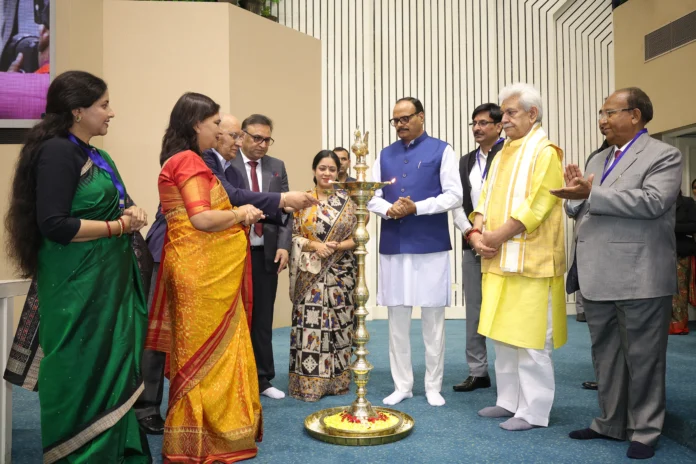
By Sanjay Raman Sinha
The rollout of NEP 2020 has revived long-standing North-South tensions, especially over the contentious three-language policy. Tamil Nadu’s staunch opposition is morphing into a broader political and emotive issue.
As language and identity once again dominate headlines, the Bharat Shiksha Summit 2025, organized by APN News channel and the Balaji Foundation at Vigyan Bhawan, sought to bring clarity and unity in this charged atmosphere. The discussion focussed on “Shaping the Future of Education: Addressing Challenges and Opportunities”.
Lieutenant Governor of Jammu and Kashmir Manoj Sinha in his keynote address focussed on the need for value-based education. He said:” I believe all universities in the country should join hands for value based education. In my opinion, somewhere along the line, the moral link between university/college campuses and society has been severed. We need to work on incorporating essential life values like truth, love, non-violence, mutual harmony, sacrifice, and cooperation, which are integral to family and society, into campus classrooms. We must reflect on why this disconnection happened and how to change it.”
The NEP 2020 aims to transform India’s educational landscape, moulding the future of crores of students and reshaping the country’s educational ecosystem. The social and political ramifications are far reaching.
Prof (Dr.) Ranbir Singh, founding Vice-Chancellor, National Law University, Delhi, and legal advisor to the prime minister touched a sensitive cord and underlined the importance of English language. He said: “We’ve been emphasizing language, and local languages are important, but when it comes to developing global competencies, the importance of language may vary. In such cases, learning languages like English, which is widely used globally, becomes essential.”
Prof. (Dr.) Prabhat Ranjan, Vice-Chancellor of DY Patil International University, focussed on student learning, research, and lifelong education. Underlining the importance of being open to learning at any stage in life, Prof. Ranjan said that there is a need to learn new things every day.
The NEP 2020 seeks to transform education by emphasizing inclusivity, flexibility, and holistic learning. By focusing on skill development, critical thinking, and creativity, the policy aims to equip students with practical knowledge to tackle real-world challenges and thrive beyond the academic universe.
Naveen Jindal, a three-time member of Parliament from Kurukshetra and Founding Chancellor of OP Jindal Global University advocated a student-centric approach nurturing future leaders through interdisciplinary education and research. Jindal maintained: “Students should study areas of interest, following their “swadharma” (natural inclination). The National Education Policy promotes this. Close industry-university collaboration is needed to ensure relevant, contemporary teaching, especially with the rapid changes brought by artificial intelligence.”
While the South is crossing swords with the North over language, it is heartening to note that under the NEP almost all official Indian languages, including southern languages, are being taught under the three language formula in Uttar Pradesh.
Brajesh Pathak, Deputy Chief Minister, Uttar Pradesh, said: “With the changing times, we need to adapt and evolve. Our youth should be equipped to take on the challenges of the future. The new education policy emphasizes learning in one’s mother tongue, which can be any regional language. This is because a child’s grasping power is highest in their mother tongue. We must allow students to pursue their interests and passions, rather than forcing them into predetermined paths. The emphasis should be on knowledge, not just marks and grades. Our education system should foster creativity, innovation, and skill development.”
The NEP 2020 introduces vocational education in schools, focusing on practical skills to prepare students for the job market, making education more relevant to the economy’s needs.
SPS Baghel, Minister of State in the Ministry of Fisheries, Animal Husbandry, Dairying and Panchayati Raj was unequivocal about the importance of English in the education system. “The education system should prioritize mother-tongue instruction, but English is now essential for success. A strong foundation in math and English is crucial, and with good tuition made available in rural areas the students from Hindi medium background can benefit. The interview system should be abolished, as the Modi government has done for non-clerical jobs.”
The success of NEP depends on an organic coordination between its stakeholders. BL Verma, minister of state, consumer affairs, food and public distribution, and minister of state, social justice and empowerment said: “I believe that we need to work together in the field of education. We should share our experiences and knowledge to provide better education to our students. I am confident that if we collaborate, we can make a significant contribution to education and can find solutions to the challenges we face.”
Nation-building through education has been a central theme of the NEP. While echoing this sentiment, Manoj Tiwary, MP, BJP said:”Education should empower individuals to become good human beings and contribute to the country’s development. Education should connect people to the country, and youth should participate in nation-building. This is the aim of the New Education Policy as well.”
Rajshri Rai, editor-in-chief, APN News and Chairperson, Balaji Foundation, stressed stakeholder involvement in the implementation process. She held: “The NEP is not just about one person or government, but about the collective efforts of all stakeholders. Stakeholder participation in shaping the future of education is of paramount importance. The NEP is a crucial document that will affect the lives of millions of students and teachers. Therefore, it is essential to have a diverse range of perspectives and opinions to ensure that the policy is effective and beneficial for all. Students are the primary stakeholders in the education system, and their voices need to be heard.”
The canvas of NEP is vast and ambitious. But it requires collaborative efforts from stakeholders to ensure successful implementation only then a more equitable education system can evolve.

